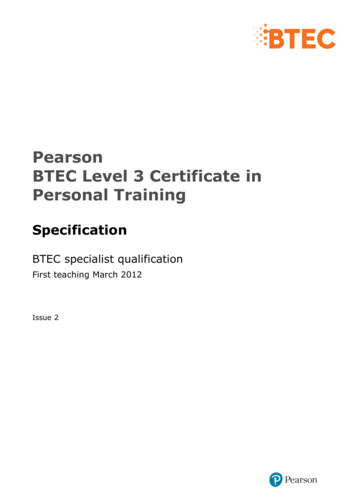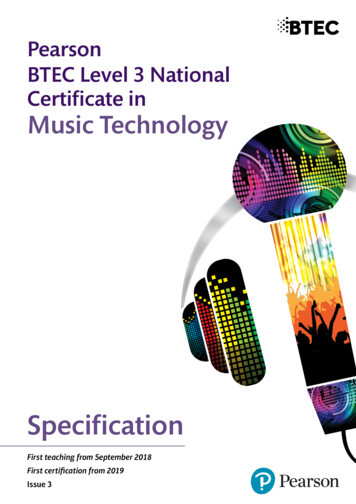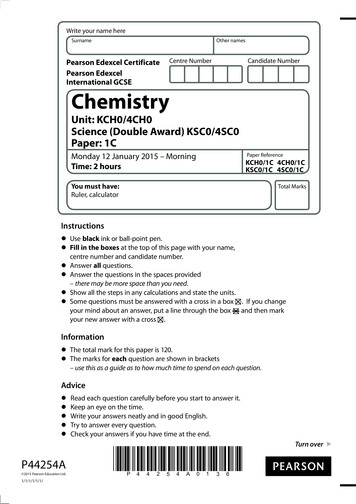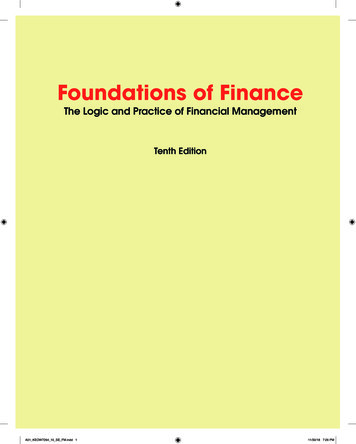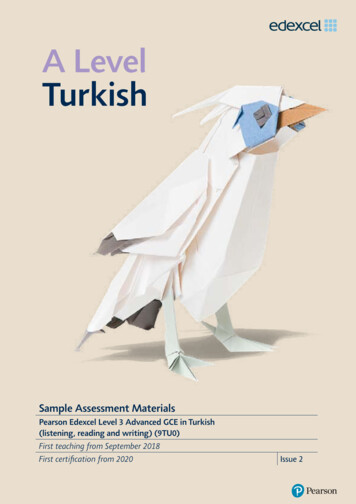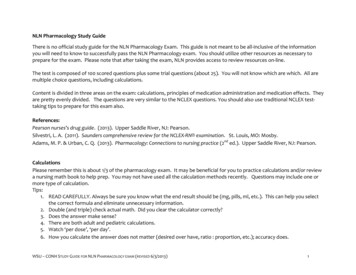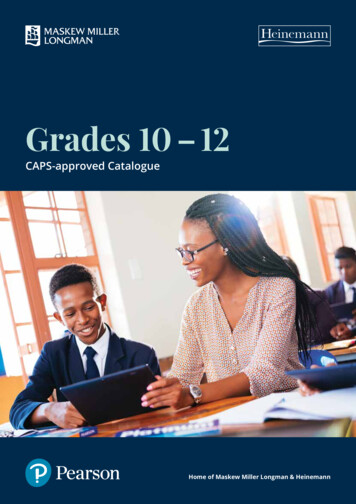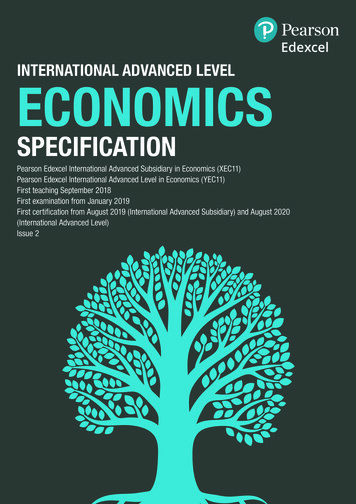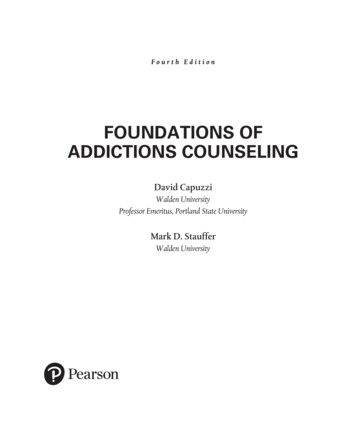
Transcription
Fourth EditionFOUNDATIONS OFADDICTIONS COUNSELINGDavid CapuzziWalden UniversityProfessor Emeritus, Portland State UniversityMark D. StaufferWalden UniversityA01 CAPU6932 04 SE FM.indd 120/03/2019 14:36
Director and Publisher: Kevin M. DavisPortfolio Manager: Rebecca Fox-GiegContent Producer: Pamela D. BennettDigital Studio Producer: Lauren CarlsonPortfolio Management Assistant: Maria FelibertyExecutive Field Marketing Manager: Krista ClarkExecutive Product Marketing Manager: ChristopherBarryProcurement Specialist: Deidra HeadleeCover Designer: Carie KellerCover Photo: Heaven’s Gift xxx89/Moment/Getty ImagesFull Service Vendor: Pearson CSCFull Service Project Management: Pearson CSC,Emma Rama and Rajakumar VenkatesanComposition: Pearson CSCPrinter/Binder: LSC Communications, Inc.Cover Printer: Phoenix Color/HagerstownText Font: Albertina MT ProCopyright 2020, 2016, 2012 by Pearson Education, Inc. 221 River Street, Hoboken, NJ 07030. All RightsReserved. Printed in the United States of America. This publication is protected by copyright, and permission shouldbe obtained from the publisher prior to any prohibited reproduction, storage in a retrieval system, or transmission inany form or by any means, electronic, mechanical, photocopying, recording, or otherwise. To obtain permission(s) touse material from this work, please visit ts of third party content appear on the page within the text, which constitute an extension of thiscopyright page.Unless otherwise indicated herein, any third-party trademarks that may appear in this work are the property of theirrespective owners and any references to third-party trademarks, logos or other trade dress are for demonstrative ordescriptive purposes only. Such references are not intended to imply any sponsorship, endorsement, authorization, orpromotion of Pearson’s products by the owners of such marks, or any relationship between the owner and PearsonEducation, Inc. or its affiliates, authors, licensees or distributors.Library of Congress Cataloging-in-Publication DataNames: Capuzzi, Dave, editor. Stauffer, Mark D., editor.Title: Foundations of addictions counseling / [edited by] David Capuzzi,Walden University, Professor Emeritus, PortlandState University, Mark D. Stauffer, Walden University.Description: Fourth edition. Hoboken, New Jersey : Pearson Education,[2020] Includes bibliographical references.Identifiers: LCCN 2018054354 ISBN 9780135166932 ISBN 0135166934Subjects: LCSH: Drug abuse counseling.Classification: LCC RC564 .F69 2020 DDC 362.29/186--dc23 LC record available at https://lccn.loc.gov/20180543541 19ISBN 10: 0-13-516693-4ISBN 13: 978-0-13-516693-2A01 CAPU6932 04 SE FM.indd 220/03/2019 14:36
PREFACEWhether you are entering the field of addictions counseling or are a counselor who wants to beprepared for the screening, assessment, and treatment of addiction in your practice, this textprovides a foundational basis. Foundations of Addictions Counseling addresses real-life clinical concerns while providing the necessary information to keep up to date with trends. It also addressesthe evolving standards of professional organizations, accrediting bodies, licensure boards, andgraduate programs and departments. Counselors in school, mental health, rehabilitation, hospital, private practice, and a variety of other settings must be thoroughly prepared to support clients in their quest to be healthy and unimpaired. As the addictions profession has matured,more and more emphasis has been placed on the importance of preparing counselors to workholistically and synthesize knowledge domains from mental health, developmental, and addiction perspectives. The authors provide this knowledge in support of your work on behalf ofvarious clients and diverse communities.Counselors can expect some of their clients to want to address concerns connected withthe use of substances and the development of addictive behavior. This book draws on the specialized knowledge for each contributed chapter. It is written for use in graduate-level preparation programs for counselors. Because of the clarity of the writing and the use of case studies, itmay also be adopted in some undergraduate and community college courses. Requirements ofthe Council for the Accreditation of Counseling and Related Educational Programs (CACREP)and other certification associations have led most university programs in counselor educationto require an addictions course for all students, regardless of specialization (school, community,rehabilitation, couples, marriage and family, student personnel, etc.). Addictions counseling isalso being offered for CADC I and II certifications, which require undergraduate courseworkrelated to addictions counseling.NEW TO THIS EDITION Extended discussion in the chapters dedicated to substance and process addictions (Chapters 2and 3, respectively) Another major revision of Chapter 16 so that prevention across the lifespan is more comprehensively addressed in this edition Additional case studies throughout to further illustrate points and enliven class discussion Additional informational sidebars to encourage the visual learner and reader contemplation A newly written chapter 13 on maintenance and relapse prevention Restructuring of the chapters on professional issues (Chapter 4), assessment and diagnosis(Chapter 6), treatment of comorbid disorders (Chapter 9), addiction pharmacotherapy(Chapter 11), and lesbian, gay, bisexual, transgender, and queer (LGBTQ) affirmative addictions treatment (Chapter 19) A new chapter on substance use and families Integration of updated and current research from the field’s peer-reviewed journals A revised instructor’s manual that includes updated journaling exercises, group work, andexperiential exercises for the online as well as face-to-face classroom.iiiA01 CAPU6932 04 SE FM.indd 320/03/2019 14:36
ivPrefaceIt is our hope that this fourth edition of Foundations of Addictions Counseling will provide the beginning student counselor with the basics needed for follow-up courses and supervised practice inthe arena of addictions counseling.Although the text addresses the history, theories, and research related to addictions counseling, at least half of the book’s emphasis is on techniques and skills needed by the practitioner.In addition, guidelines for addictions counseling in family, rehabilitation, and school settings areaddressed, as are topics connected with cross-cultural counseling and addictions. Some of thetopics that make the text engaging and of high interest to readers are: Concrete reference to assessment toolsOutpatient and inpatient treatmentMaintenance and relapse preventionCounseling with addicted/recovering clientsCounseling couples and families that are coping with addictions issuesAddictions prevention programs for children, adolescents, and college studentsWriters experienced in addictions counseling were asked to contribute so that the reader isprovided with not only theory and research but also with those applications so pertinent to therole of the practicing, licensed, and certified addictions counselor. This text also reflects the viewof the editors that counselors must be prepared in a holistic manner, since addiction issues are sooften the reason clients seek the assistance of a professional counselor.The book is designed for students taking a preliminary course in addictions counseling. Itpresents a comprehensive overview of the foundations of addictions counseling, the skills andtechniques needed for addictions counseling, and addictions counseling in specific settings. Aseditors, we know that one text cannot adequately address all the complex and holistic factorsinvolved in assisting clients who present with issues related to addictive behavior. We have,however, attempted to provide our readers with a broad perspective based on current professional literature and the rapidly changing world we live in at this juncture of the new millennium. The following overview highlights the major features of the text.OVERVIEWThe format for the co-edited text is based on the contributions of authors who are recognizedfor their expertise, research, and publications. With few exceptions, each chapter contains casestudies illustrating practical applications of the concepts presented. Most chapters refer thereader to Websites containing supplemental information.The text is divided into the following four parts, with the rehabilitation chapter cappingthe textbook: (1) Introduction to Addictions Counseling; (2) The Treatment of Addictions;(3) Addictions in Family Therapy, Rehabilitation, and School Settings; and (4) Cross-CulturalCounseling in Addictions.PART 1 Introduction to Addictions Counseling (Chapters 1–6) begins with informationon the historical perspectives and etiological models that serve as the foundation for currentapproaches to addictions counseling and provides the reader with the contextual backgroundneeded to assimilate subsequent chapters. Chapters focused on substance and process addictions, professional issues, an introduction to assessment, and assessment and diagnosis of addictions are included as well.A01 CAPU6932 04 SE FM.indd 420/03/2019 14:36
PrefacevThe Treatment of Addictions (Chapters 7–13) presents information about motivational interviewing, other psychotherapeutic approaches, comorbid disorders, group work,pharmacotherapy, 12-step programs, and maintenance and relapse prevention. All chaptersprovide overviews and introduce readers to the skills and techniques used in the addictionscounseling process.PART 2Addictions and Family Therapy, Rehabilitation, and School Settings (Chapters14–16), presents information relative to addiction and families; persons with disabilities; andchildren, adolescents, and college students. These chapters highlight information that has relevance and application to diverse contexts.PART 3Cross-Cultural Counseling in Addictions (Chapters 17–19) discusses ethnic diversity; gender and addictions; and LGBTQ affirmative addictions treatment.PART 4EPILOGUE Some Additional Perspectives consists of a revised chapter 20 on inpatient andoutpatient rehabilitation provides the readership with even more information than in the thirdedition of the text.We think the additional case studies included in this fourth edition along with the use ofsidebars enliven the content and make the text even more user friendly and practitioner oriented.Every attempt has been made by the editors and contributors to provide the reader withcurrent information in each of the 20 areas of focus. It is our hope that this fourth edition of Foundations of Addictions Counseling will provide the beginning student counselor with the basics neededfor follow-up courses and supervised practice in the arena of addictions counseling with clients.ALSO AVAILABLE WITH MYLAB COUNSELINGThis title is also available with MyLab Counseling, an online homework, tutorial, and assessmentprogram designed to work with the text to engage students and improve results. Within itsstructured environment, students see key concepts demonstrated through video clips, practicewhat they learn, test their understanding, and receive feedback to guide their learning and ensurethey master key learning outcomes.Learning Outcomes and Standards measure student results. My Lab Counseling organ-izes all assignments around essential learning outcomes and national standards for counselors.Video- and Case-based Exercises develop decision-making skills. Video- and Case-basedExercises introduce students to a broader range of clients, and therefore a broader range of presenting problems, than they will encounter in their own pre-professional clinical experiences. Studentswatch videos of actual client–therapist sessions or high-quality role-play scenarios featuring expertcounselors. They are then guided in their analysis of the videos through a series of short-answerquestions. These exercises help students develop the techniques and decision-making skills theyneed to be effective counselors before they are in a critical situation with a real client.Licensure Quizzes help students prepare for certification. Automatically graded, multiplechoice Licensure Quizzes help students prepare for their certification examinations, master foundational course content, and improve their performance in the course.A01 CAPU6932 04 SE FM.indd 520/03/2019 14:36
viPrefaceVideo Library offers a wealth of observation opportunities. The Video Library providesmore than 400 video clips of actual client–therapist sessions and high-quality role-plays in adatabase organized by topic and searchable by keyword. The Video Library includes every videoclip from the MyLab Counseling courses plus additional videos from Pearson’s extensive libraryof footage. Instructors can create additional assignments around the videos or use them for inclass activities. Students can expand their observation experiences to include other course areasand increase the amount of time they spend watching expert counselors in action.ACKNOWLEDGMENTSWe would like to thank the authors who contributed their expertise, knowledge, and experiencein the development of this book. We would also like to thank our families, who provided us withthe freedom and encouragement to make this endeavor possible. Our thanks are also directed tomembers of the Pearson production team for their encouragement and assistance with copyediting and, ultimately, the publication of the text.Special thanks are extended to Cass Dykeman, Professor of Counselor Education at OregonState University, and Mita Johnson, core faculty in Mental Health Counseling in the School ofCounseling at Walden University, for their suggestions on content areas included in this text.Thanks to their input, readers of Foundations of Addictions Counseling will benefit from a morecomprehensive overview of counseling with clients experiencing addictions issues.Finally, we would like to thank the reviewers of our manuscript for their comments andinsights: Daniel Bishop, Concordia University Chicago; Joanne Munro, California State University, Fullerton; Robert Pace, University of Houston–Clear Lake; Cristen Wathen, Montana StateUniversity; and Tricia Witte, The University of Alabama in Huntsville.A01 CAPU6932 04 SE FM.indd 620/03/2019 14:36
CONTRIBUTORSMEET THE EDITORSDavid Capuzzi, PhD, NCC, LPC, is a counselor educator and senior core faculty in CommunityMental Health Counseling Program at Walden University and Professor Emeritus at PortlandState University. Previously, he served as an affiliate professor in the Department of CounselorEducation, Counseling Psychology, and Rehabilitation Services at Pennsylvania State Universityand Scholar in Residence in counselor education at Johns Hopkins University. He is past president of the American Counseling Association (ACA), formerly the American Association forCounseling and Development, and past Chair of both the ACA Foundation and the ACA Insurance Trust.From 1980 to 1984, Dr. Capuzzi was editor of The School Counselor. He has authored severaltextbook chapters and monographs on the topic of preventing adolescent suicide and is coeditor and author with Dr. Larry Golden of Helping Families Help Children: Family Interventions withSchool Related Problems (1986) and Preventing Adolescent Suicide (1988). He coauthored and editedwith Douglas R. Gross Youth at Risk: A Prevention Resource for Counselors, Teachers, and Parents (1989,1996, 2000, 2004, 2008, 2014, and 2019); Introduction to the Counseling Profession (1991, 1995,1997,2001, 2005, 2009, and 2013); Introduction to Group Work (1992, 1998, 2002, 2006, and 2010); andCounseling and Psychotherapy: Theories and Interventions (1995, 1999, 2003, 2007, and 2011).In addition to this textbook, Dr. Capuzzi and Dr. Stauffer have published Career Counseling:Foundations, Perspectives, and Applications (2006, 2012); Foundations of Couples, Marriage and FamilyCounseling (2015); Human Growth and Development Across the Life Span: Applications for Counselors(2016); and Counseling and Psychotherapy: Theories and Interventions (2016).Other texts are Approaches to Group Work: A Handbook for Practitioners (2003), Suicide across theLife Span (2006), and Sexuality Issues in Counseling, the last coauthored and edited with Larry Burlew.He has authored or coauthored articles in a number of ACA-related journals.A frequent speaker and keynoter at professional conferences and institutes, he has alsoconsulted with a variety of school districts and community agencies interested in initiating prevention and intervention strategies for adolescents at risk for suicide. He has facilitated thedevelopment of suicide prevention, crisis management, and postvention programs in communities throughout the United States; provides training on the topics of youth at risk and grief andloss; and serves as an invited adjunct faculty member at other universities as time permits.An ACA fellow, Dr. Capuzzi is the first recipient of ACA’s Kitty Cole Human Rights Awardand also a recipient of the Leona Tyler Award in Oregon. In 2010, he received ACA’s Gilbert andKathleen Wrenn Award for a Humanitarian and Caring Person. In 2011, he was named a Distinguished Alumni of the College of Education at Florida State University and, in 2016, he receivedthe Locke/Paisley Mentorship award from the Association for Counselor Education and Supervision. In 2018 he received the Mary Smith Arnold Anti-Oppression Award from the Counselorsfor Social Justice, a division of ACA, as well as the U.S. President’s Lifetime Achievement Award.Mark D. Stauffer, PhD, NCC, is core faculty in the Community Mental Health Counseling Program at Walden University. He specialized in couples, marriage, and family counseling duringhis graduate work in the Counselor Education Program at Portland State University where heviiA01 CAPU6932 04 SE FM.indd 720/03/2019 14:36
viiiContributorsreceived his master’s degree. He received his doctoral degree from Oregon State University,Department of Teacher and Counselor Education.As a clinician, Dr. Stauffer has worked in the Portland Metro Area in Oregon at crises centers and other non-profit organizations working with low income individuals, couples, and families. He has studied and trained in the Zen tradition, and presents locally and nationally onmeditation and mindfulness-based therapies in counseling.Dr. Stauffer is a member of the International Association of Addiction and OffenderCounseling. He was a Chi Sigma Iota International fellow and was awarded the ACA’s EmergingLeaders Training Grant as well as the U.S. President’s Volunteer Service Award. He is pastco-chair of the American Counseling Association International Committee and served asPresident of the Association for Humanistic Counseling (2018–2019).MEET THE CONTRIBUTORSKelly Aissen, PhD, LPC, earned her PhD in Counselor Education in Mental Health Counselingfrom the University of Florida. She is a Licensed Mental Health Counselor and a Qualified Clinical Supervisor in Florida. Dr. Aissen is also Counseling Adjunct Faculty at Northwestern University, teaching courses in substance abuse and addiction, lifespan development, diagnosis andtreatment, and adolescent counseling. She presents at local, regional, and national conferenceson impaired professionals in recovery, addiction treatment strategies, concept mapping, andcommunication skill development. Her current clinical, teaching, and research interests encompass women's issues, the family disease of addiction, life & work transitions, and interpersonalrelationships. Additionally, Dr. Aissen has developed corporate trainings for workplace communication and team-building skills; counseled in inpatient/outpatient psychiatric and substance abuse treatment programs; counseled developmentally delayed adults in residentialgroup homes; and has taught independent living skills to foster care children and teens.Lisa Langfuss Aasheim, PhD, LPC, is Associate Professor in the Counselor Education Department at Portland State University and served as Director of the Community Counseling Clinicand Coordinator of the School Counseling Program at PSU for over a decade. She is a renownedspecialist in clinical supervision and is the author of Practical Clinical Supervision for Counselors: AnExperiential Guide (Springer). Dr. Aasheim specializes in couples and family counseling, addictions counseling, and school counseling and has written textbook chapters and articles on motivational interviewing, counselor development, ethics in the work settings, the therapeuticalliance, family counseling in the schools, and addictions in the school, home, and workplace.Amy L. Barth, PhD, LPC, is Assistant Professor in the Department of Counselor Education at theUniversity of Wisconsin–Whitewater, where she has taught courses in clinical skills, counselingtheories, diagnosis, marriage and family counseling, lifespan development, and practicum andinternship. Her research interests include personal guiding theory development, counselor identity development, and supervision. Dr. Barth holds counseling licenses in both Illinois and Wisconsin. She has over 15 years of counseling experience, working with individuals, families, andgroups in both agency and university settings. Additionally, she provides clinical supervision topostgraduate counselor trainees.Malvika Behl, PhD, NCC, received her doctoral degree in Counselor Education and Supervisionfrom the University of Toledo, Ohio. Currently she is Assistant Professor and School CounselingA01 CAPU6932 04 SE FM.indd 820/03/2019 14:36
ContributorsixProgram Chair at West Texas A&M University (WTAMU). She currently teaches graduatecourses in counseling at WTAMU. Dr. Behl is a Licensed School Counselor (Ohio), NationallyCertified Counselor, and a Licensed Professional Counselor – Intern (Texas). She is currentlyworking as an intern at the counseling center at WTAMU. Her research interests include behavioral supervision, substance abuse counseling in school systems, diagnosing qualification forschool counselors, embedded therapy, and trauma-focused cognitive-behavioral therapy.Cynthia A. Briggs, PhD, LPC, NCC, completed her BS in Psychology at Guilford College, herMAEd in Community Counseling at Wake Forest University, and her PhD in Counseling at Oregon State University. Her first experiences as a counselor were in the addictions field. Sheobserved gaps in treatment, particularly for female clients, that led her to become an advocateand leader in the field. She coauthored a textbook on women and addiction, and has presentedon addictions issues with adolescent girls and in the veteran population.Stephanie A. Calmes, PhD, LPCC-S, LICDC-CS, is the Clinical Director of SUD/Dual Services atHarbor Behavioral Health in Toledo, Ohio. With 15 years of experience in detox, residential,outpatient, and intensive outpatient treatment of individuals with substance use and mentalhealth disorders, she currently directs and supervises all substance use disorder programmingand clinical staff. Dr. Calmes obtained her bachelor’s in Psychology from Miami University(Oxford, OH), and both her masters in Community Counseling and Doctorate in CounselorEducation and Supervision from the University of Toledo.Richard J. Cicchetti, PhD, LCPC, CRC, SAT-P, is core faculty in the Clinical Mental Health Counseling Program at Walden University. He graduated from Old Dominion University with a doctorate in Counselor Education and Supervision and a Master’s degree in counseling with aspecialization in rehabilitation counseling from Northeastern Illinois University and completedtraining in the treatment of sexual addictions at Mid America Nazarene University. Dr. Cicchettihas served in leadership positions in academia as well as in counseling associations. He has published articles and book chapters on counseling, sexual addictions, substance abuse, processaddictions, and issues related to grief education and training. Dr. Cicchetti has presented atnational and state conferences. He has held faculty positions at Adler School of ProfessionalPsychology, the Chicago School of Professional Psychology, and Grand Canyon University. Healso has a private practice in Chicago.Pamela A. Cingel, PhD, earned her doctoral degree from the University of Toledo in 1992. Shehas been a full-time counselor educator and psychology instructor for 28 years. She has over 16years of clinical experience as a counselor. Dr. Cingel was the manager of an inpatient chemicaldependency unit for adolescents and provided clinical supervision to various community agencies. She is currently Dean of Biscayne College and Professor in the Psychology Program, Director of a Faculty and Student Research Center, and Director of Dual Enrollment at St. ThomasUniversity. Her research interests include emotional intelligence, adolescents, and gender studies.Cass Dykeman, PhD, is Associate Professor in the College of Education at Oregon State University. He received a masters in counseling from the University of Washington and a doctorate incounselor education from the University of Virginia. He served as Principal Investigator for a 1.5 million federal school-to-work research project. In addition, he is the author of numerousbooks, book chapters, and scholarly journal articles. Dr. Dykeman is past president of both theA01 CAPU6932 04 SE FM.indd 920/03/2019 14:36
xContributorsWashington State Association for Counselor Education and Supervision and the Western Association for Counselor Education and Supervision. His current research interests include mathanxiety and corpus linguistics.Abbé Finn, PhD, is Program Director for the Clinical Mental Health Counseling Programs in theMarieb College of Health and Human Services at Florida Gulf Coast University. She has a PhDfrom the University of New Orleans Counselor Education Program, has an MA in Counselingfrom Loyola University in New Orleans, an MEd in Early Childhood Education from Tulane University, and a bachelor’s degree in Speech Pathology and Audiology from Tulane University.Dr. Finn has been a university faculty member since 1998. She teaches a variety of courses including addictions, lifespan development, counseling techniques, appraisal, and legal and ethicalissues in counseling. She has worked extensively in the mental health field working with individuals as well as groups in counseling. Before joining the university faculty full time, Dr. Finn was anEmployee Assistance Counselor with the U.S. Postal Service Employees Assistance Program andworked at a residential treatment facility. She specialized in working with groups in crisis response,survivors of childhood sexual trauma, and with clients in addiction recovery. Dr. Finn volunteerswith organizations such as the Red Cross responding to natural and man-made disasters. Theseinclude the September 11, 2001, attack on the World Trade Center; the earthquake in Haiti; andHurricanes Katrina and Rita. Her areas of research include counseling people with addictions,suicide prevention, workplace and school violence prevention, and addiction prevention.Scott E. Gillig, PhD, earned his doctoral degree from the University of Toledo in 1988. He hasbeen a full-time professor for 28 years. He has over 20 years of clinical experience as a counselor.He has worked with chemically dependent adolescents and adults in a dual-diagnosis chemicaldependency treatment residential unit. Dr. Gillig is currently Professor and Director of the Educational Leadership Master’s Program at St. Thomas University in Miami, Florida. He teachesundergraduate, masters’ and doctoral courses. His research interests include counseling outcomes, depression, chemical dependency, treatment planning, and student mentoring. Dr. Gillighas served as chair on two dozen successful dissertation committees. He is currently coauthoring a book on Puerto Rican student hurricane survival narratives and coauthoring a study onusing computer technology for student learning and engagement. He developed and teaches acourse in photo psychology both domestically and in Italy.Laura R. Haddock, PhD, received her doctoral degree in Counselor Education and Supervisionfrom the University of Mississippi and currently serves as a clinical faculty member at SouthernNew Hampshire University. She has been a counseling professional for over 25 years in bothclinical and academic settings. Dr. Haddock is a licensed professional counselor-supervisor,national certified counselor, and approved clinical supervisor. She is an active counseling professional and has served on the Mississippi Licensed Professional Counselors Board of Examiners and the executive boards for the Mississippi Counseling Association and Mississippi LicensedProfessional Counselors Association. Dr. Haddock maintains an active research agenda and wasthe 2017 recipient of the Association of Counselor Education and Supervision DistinguishedService Award–Counselor Educator. Her research interests include counselor wellness and secondary trauma, gatekeeping, sexuality, cultural diversity, and supervision.Melinda Haley, PhD, received her master’s in Counselor Education at Portland State Universityand her Doctorate in Counseling Psychology from New Mexico State University and wasA01 CAPU6932 04 SE FM.indd 1020/03/2019 14:36
ContributorsxiAssistant Professor at the University of Texas, El Paso, in the Counseling and Guidance Programfor 5 years. Dr. Haley currently works as a core faculty member in the Counselor Education andSupervision Doctoral Program at Walden University. She has written numerous book chaptersand journal articles on diverse topics related to counseling. She has extensive applied experienceworking with adults, adolescents, children, inmates, domestic violence offenders, and culturallydiverse po
rehabilitation, couples, marriage and family, student personnel, etc.). Addictions counseling is also being offered for CADC I and II certifications, which require undergraduate coursework related to addictions counseling. NEW TO THIS EDITION Extended discussion in the chapters
